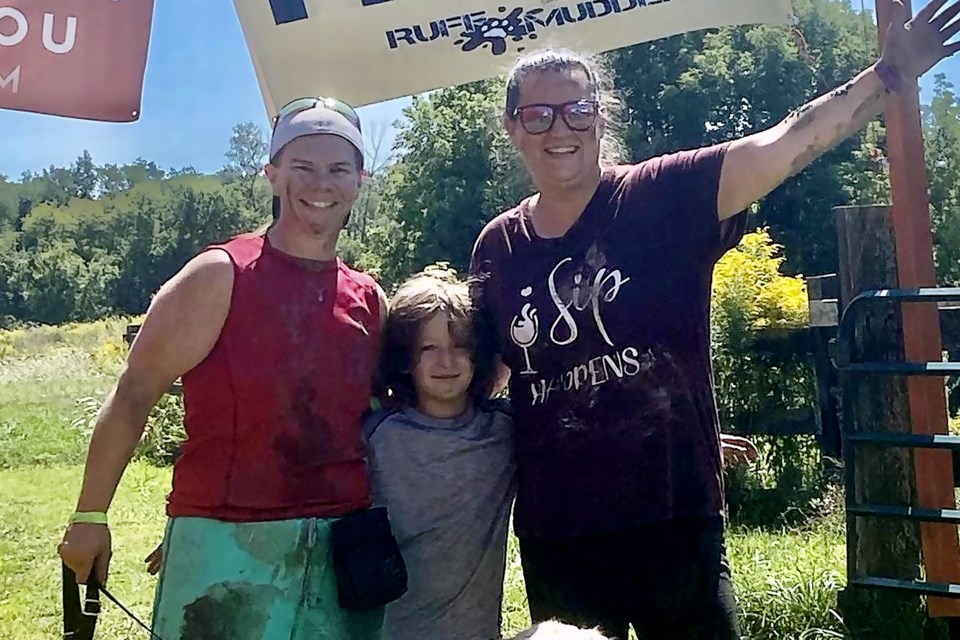Kyla needs a kidney.
As a young mother, wife, educator and health-care professional, Kyla Roy knows it's a serious thing to ask for.
But she said she has to ask, because there are some days she barely has the energy to get out of bed, let alone be a mom, a life partner and still go to work.
It was eight years ago that Kyla had Crohn's Disease, but the medication she was prescribed resulted in kidney disease.
"The damage was already done by the time they stopped the medication. My kidney function continued to decline over the years,” Roy said. “In July 2022, I found out I needed a kidney transplant and began the work up to see if I was a good candidate and if I would qualify.”
Roy had been working as an Emergency Room nurse at Health Sciences North up until she learned she had kidney disease.
"When I got sick, my health care team decided that the emergency department wasn't the best place for me to be because of all the potential exposures."
As a registered nurse, Kyla applied for a teaching job at Cambrian College and to this day she is a teacher in the practical nursing program there.
It was last summer that things got worse for Roy when it became apparent that her kidneys were no longer functioning as well as they should.
“I just found out last July that I was in need of a kidney transplant," Roy said.
She visited the London (Ontario) Health Sciences Centre to discuss her options. The London hospital is where the transplant surgery would take place, said Roy.
"And they want to do a pre-emptive transplant before I end up on dialysis, because those tend to be more successful," Roy explained.
She was hopeful. Most people have two kidneys, but you can do fine with just one. A donor is required to have a matching blood type and to be in excellent health.
"And they're just very firm about not taking a kidney from somebody who wasn't fully healthy or didn't have the ability to function well with one kidney because most people only need one kidney to live. But if you have other other health factors that complicate it, then they won't consider you as a candidate," said Roy.
She said the ideal situation would have been to have a kidney donated by a family member because of the close match with one's genes and DNA. Roy said her immediate family members — mother, father and brother — were not suitable candidates due to individual health conditions. Roy said it was a similar thing with her wife who is very healthy, but testing showed she was not a good blood match.
In the meantime, Roy said she is doing her best to stay as healthy and energetic as possible for her wife and her nine-year-old son.
Roy said this now leaves her at the mercy of the donor wait list, which is essentially determined by such things as blood match and urgency. It could be several months. It could be three or four years.
The process is described by the Ontario Renal Network website as follows:
"At the transplant hospital, a team of specialists will find out if you are suitable for a kidney transplant. If you are, you will be placed on the provincial waitlist for a kidney donated by someone who has died (deceased donor transplantation). If you have any potential living donors, they will also be evaluated at the transplant hospital to see if they are suitable for donation and if they are a match for you.”
Roy said her hope is to find a donor as soon as possible because the healthier she is, the better the chance of a successful transplant. She said her blood type is B-positive, but type-O and any other blood type is encouraged.
She said she has been reaching out to a wider community through emails and a Facebook page hoping to find a donor while at the same time, hoping that people learn more about the transplant process.
"I think I'm just hoping for two takeaways from this; one being if everybody can spread the word, because that's how most people end up finding their donor is through media outlets, and whatnot,” said Roy. "And just the importance of looking into organ donation in general, like bringing awareness to organ donation.
“I know that as much as I am not where I want to be in life with my health at 38 years old, other people are much worse off," said Roy.
"Organ donations not only saves lives, but improves lives and gives people and families their lives back."
Roy said there are four options for a kidney donation:
- Living related donor (most kidney longevity post transplant).
- Living unrelated (less kidney longevity but on average approximately 11 years).
- Non-Living donor - up to 5 years on the waitlist.
- Paired exchange program through the Canadian Blood Services.
Anyone that is interested in donating or learning more can reach out to Beth Montesi at the London Health Sciences Centre at 519-685-8500 or [email protected] to let them know they might be a potential donor for Kyla Roy.
Len Gillis writes about health issues and also the mining industry for Sudbury.com.
